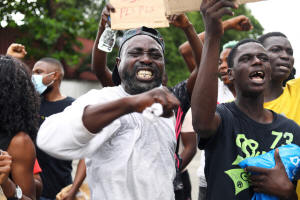Nigerian rights panel, underfunded and overmatched, begins probe of
powerful military
 Send a link to a friend
Send a link to a friend
 [February 07, 2023]
By Libby George [February 07, 2023]
By Libby George
(Reuters) - A special panel named by Nigeria's National Human Rights
Commission launched an investigation Tuesday into recent Reuters reports
on rights abuses by the country’s army. Those familiar with the
commission’s past work say it faces stiff challenges.
The state-funded NHRC does its best to press officials to act in the
interest of citizens whose rights have been violated, eight sources with
knowledge of the commission said. But they said the NHRC, whose inquiry
was supported by the government amid an international outcry, is hobbled
by a lack of authority to compel military leaders and other officials to
prosecute or punish anyone.
None of these people, including rights lawyers and researchers, was
aware of any major cases handled by the commission that had led to the
prosecution of senior Nigerian officials – a lack of accountability
underscored in United Nations and U.S. State Department reports. The
commission has secured financial restitution for some victims of abuse.
“Nigeria does not have a decent track record at holding its own
accountable,” said Ikemesit Effiong, head of research at Lagos-based
consultancy SBM Intelligence, who has followed the commission’s work.
“That is even more stark if the stakeholders are military.”

Despite the “brave, serious” people on the commission, a government
referral to the NHRC translates to “let’s bury the matter,” said human
rights lawyer Nelson Olanipekun, founder of Gavel, a nonprofit promoting
justice.
The commission-appointed panel, headed by a former Supreme Court justice
and including a former major general, is investigating two Reuters
articles published last year. The news agency reported on Dec. 7 that
the army has run a secret program of coerced abortions in the country’s
northeast, where it has been battling Islamist insurgents since 2009.
The program has ended the pregnancies of at least 10,000 women and girls
freed from insurgent captivity, according to witness accounts and
documents. On Dec. 12, again citing dozens of witnesses, Reuters
reported that the army intentionally killed children in the war, under a
presumption they were, or would become, terrorists. Nigerian military
leaders said the abortion program did not exist and that children were
never targeted for killing.
Commission Executive Secretary Tony Ojukwu, a veteran human rights
lawyer and activist, declined to comment for this story, apart from
urging Reuters in WhatsApp messages to “exercise caution” so as not to
prejudice people against the NHRC. It would be improper, he said, for
him to engage with Reuters because the news agency could be summoned as
a witness in the investigation.
A Reuters spokeswoman said the news agency stands by its reports on
military abuses, adding: “We are committed to covering events in Nigeria
in an impartial and independent way, as we do around the world.”
Spokespersons for Nigerian President Muhammadu Buhari, the attorney
general and the military did not respond to requests for comment about
the NHRC probe and rights abuses.
The U.S. defense and state departments, the United Nations
Secretary-General, the German foreign minister, Amnesty International
and Human Rights Watch all called for Nigeria to investigate the Reuters
findings. After initially saying an investigation would be a “waste” of
his energy, Nigerian Chief of Defense Staff Lucky Irabor agreed, amid
international pressure, to cooperate with an NHRC probe.

Asked about the new panel, the U.S. State Department urged the Buhari
administration to empower a rigorous investigation. “We implore the
Nigerian government to give the NHRC the resources and access necessary
to conduct” such a probe, a State Department spokesman said in an email.
The investigation should include “access to military and other
government-controlled locations, as well as military personnel.”
Historically, Nigerian security officials have harassed commission
members, according to a former NHRC chair and a UN questionnaire
answered by the NHRC in 2012. Chidi Odinkalu, an outspoken chairman of
the commission until 2015, told Reuters he was detained more than once
by police and security services, and continually felt unsafe in terms of
“physical security, digital security, residential security.”
“That came with the territory,” he said of the government pressure.
LARGE MANDATE, LIMITED POWER
The commission was established during Nigeria’s military rule in 1995.
In a 2002 paper, two Nigerian scholars called the body "a red herring”
to distract from human rights violations. A 2010 law gave it more
authority.
The NHRC now has the ability to recommend prosecution. But only the
attorney general, the police inspector general or prosecutors can launch
criminal proceedings. To pursue alleged wrongdoing by the military, an
officer would have to initiate a court martial.
The NHRC, described on its website as an “extra-judicial mechanism for
the respect and enjoyment of human rights,” has a 16-member governing
council nominated by the president and confirmed by the senate. It
includes lawyers, journalists and activists, as well as non-voting
representatives from three ministries.
Some NHRC findings, such as compensation awards, are enforceable by the
courts. But if the body lacks at least six members, NHRC decisions have
no effect under the law. President Buhari, who came to power in 2015,
left the commission without a quorum for five years, until 2021.

[to top of second column]
|

Nigerians take part in a protest against
alleged violence, extortion and harrassment from Nigeria's Special
Anti-Robbery Squad (SARS), in Lagos, Nigeria October 11, 2020.
REUTERS/Temilade Adelaja/File Photo

Commission findings are supposed to be public and a spokeswoman said
they were posted on its website. However, Reuters was unable to find
some reports, including two concerning alleged mass shootings of
civilians in 2015 and 2020. The news agency asked the NHRC for
access to all reports; the commission did not make them available.
The NHRC isn’t necessarily the only investigative body looking into
rights violations in Nigeria at any given time. In 2019, Agnes
Callamard, a UN official monitoring executions, reported that more
than 20 Nigerian panels, including some appointed by the NHRC,
existed at the time to probe specific abuses by the military, police
or militia members. None, to her knowledge, had brought about
prosecutions.
These panels “appear to be used mostly for whitewashing purposes, or
to facilitate a ‘cooling of the political temperature,’” Callamard
wrote.
The U.S. State Department reported that in 2019, 2020 and 2021 it
had found no reports of NHRC investigations having “led to
accountability.” A spokesman told Reuters that accountability meant
“credible, transparent investigation, and where warranted,
prosecution and punishment.”
During the Buhari administration, sources familiar with the
commission said, the NHRC has focused on training, privately
pressing officials on human rights, and awarding payments to victims
of abuse. The commission’s mandate extends beyond alleged government
abuses to include “public enlightenment,” improving access to
education and health care, and mediating disputes.
The NHRC’s budget has doubled since 2015, to about 3 billion naira
($6.53 million) in 2021. But its caseload has grown faster, tripling
in the same period to about 1.7 million.
The NHRC in the past has complained of insufficient funding. In its
2018 budget request, it noted that if it were to spend just 5,000
naira ($10.89) on each complaint, it would need 5 billion
naira($10.89 million) annually to handle that year’s caseload.

RUNNING THE RISK
The NHRC has ventured into politically sensitive territory before.
In 2013, the military allegedly killed as many as 200 civilians in
the town of Baga, in northeastern Borno state. The NHRC, in a
preliminary report released to local media, said the case
“illustrates serious concerns about proportionality of the use of
force.” No one in the military appears to have been prosecuted. The
defense ministry did not respond to a request for comment. At the
time, the army blamed the carnage on Boko Haram.
In another case, the army allegedly killed more than 300 members of
a Shi’ite minority sect in 2015 after some members blocked a
military convoy in northern Kaduna state. A state judicial
commission faulted the military for its disproportionate use of
force. While an NHRC panel also faulted those who took lives, it
said the immediate cause of the clash was the Shi’ite group’s
blockage of the highway and recommended the group apologize to the
army for violating its right to move freely, according to a 2016
press conference. Reuters was unable to obtain the full report.
No prosecutions in the army have been announced.
In October 2020, thousands of protesters successfully demanded the
disbanding of the police Special Anti-Robbery Squad (SARS), members
of which the NHRC found had extorted, tortured and killed civilians.
That same month, the army and police opened fire on protesters in
Lagos, killing at least 11, according to a state judicial panel. The
government rejected the panel’s report, citing errors and
insufficient evidence.
Before the protests, in a 2018 report, an NHRC panel had recommended
that “immediate disciplinary actions” be taken against any police
officer who violated human rights, “along with criminal
investigations and prosecutions.”

Afterward, in September 2022, the commission reported that hundreds
of thousands of dollars in restitution had been paid so far to about
100 Nigerians in SARS cases. The NHRC also recommended that 28
police officers be prosecuted, according to a commission statement.
No police prosecutions have been announced. Chief Superintendent of
Police Olumuyiwa Adejobi did not reply to a request for comment.
At the end of last year, an assistant superintendent of police shot
dead a pregnant lawyer at a Lagos state checkpoint on Christmas day.
Amid public outcry, the officer was charged with murder. He has
pleaded not guilty.
Questioned on Channels TV about whether anything had changed since
the 2020 protests, NHRC executive secretary Ojukwu said police
reform takes time.
“It does seem the situation has not substantially improved,” he
said.
($1 = 459.2000 naira)
(George reported from London. Also contributing were David Lewis in
Nairobi and Reade Levison in London. Editing by Julie Marquis and
Alexandra Zavis)
[© 2023 Thomson Reuters. All rights
reserved.]This material may not be published,
broadcast, rewritten or redistributed.
Thompson Reuters is solely responsible for this content. |